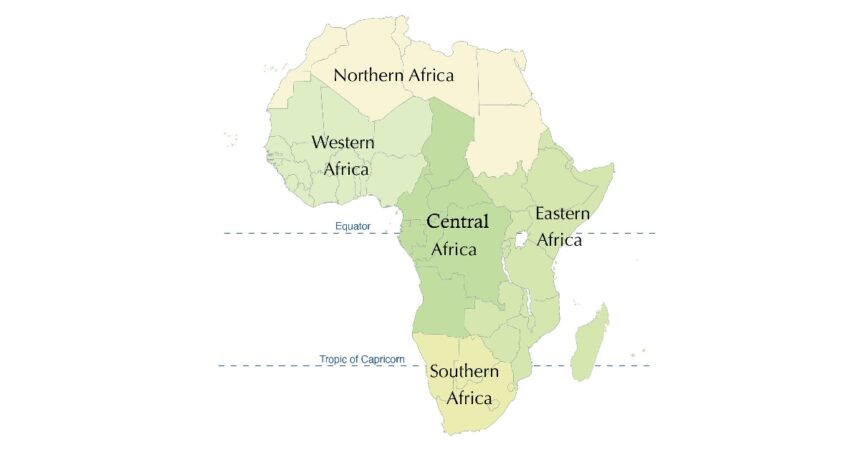Geography
- Encompasses diverse landscapes, from the highlands of Ethiopia to the Great Rift Valley
- Home to iconic natural features such as Mount Kilimanjaro, the highest peak in Africa
- Includes the vast Lake Victoria, the source of the Nile River, and the picturesque beaches of the Indian Ocean
Countries
The region consists of:
- Burundi
- Comoros
- Djibouti
- Eritrea
- Ethiopia
- Kenya
- Madagascar
- Malawi
- Mauritius
- Mozambique
- Rwanda
- Seychelles
- Somalia
- South Sudan
- Tanzania
- Uganda
- Zambia
- Zimbabwe
Population
According to the United Nations Population Division, an estimated 450 million people lived in East Africa as of 2021.
Cultural Significance
Eastern Africa is renowned for its cultural diversity, with a tapestry of languages, traditions, and customs. The region is home to ancient civilizations and archaeological sites, such as the Swahili Coast, known for its blend of African, Arab, and European influences. East Africa has also produced notable figures in literature, music, and art, contributing to the global cultural landscape.
Southern Africa Region
Southern Africa comprises the southernmost region of the African continent, characterized by a diverse range of landscapes and cultures. This region is known for its natural beauty, wildlife, and rich history.
Geography
- Encompasses a variety of ecosystems, from the arid deserts of Namibia to the lush forests of Zambia
- Features iconic landmarks such as the Okavango Delta, a vast inland delta teeming with wildlife
- Includes the Drakensberg Mountains and the Cape Floral Kingdom, a UNESCO World Heritage Site
Countries
The region consists of:
- Angola
- Botswana
- Lesotho
- Malawi
- Mauritius
- Mozambique
- Namibia
- South Africa
- Swaziland
- Zambia
- Zimbabwe
Population
According to the United Nations Population Division, approximately 215 million people lived in Southern Africa as of 2021.
Cultural Significance
Southern Africa is a melting pot of cultures, with influences from indigenous peoples, European colonizers, and Asian immigrants. The region has a rich history of struggle against colonialism and apartheid, leading to the emergence of vibrant cultural movements and political activism. Southern Africa is also known for its music, dance, and traditional festivals that celebrate the diversity of its people.
East Africa is a diverse region that extends from the Horn of Africa down along the eastern coastline and includes several significant island territories. This expansive area encompasses the Horn of Africa, the Great Rift Valley, and parts of the Nile Basin, featuring dramatic highlands in countries like Ethiopia and Kenya. East Africa is home to some of Africa’s Great Lakes, including Lake Victoria, the largest lake on the continent. Additionally, the region includes notable islands such as Madagascar, Comoros, Mauritius, and Seychelles, offering a variety of landscapes from coastal lowlands to volcanic mountains.
The countries that make up East Africa are diverse and culturally rich. From the British Indian Ocean Territory to Zimbabwe, each nation contributes to the region’s unique identity. Historically, East Africa has played a significant role in global history, with ancient trade networks, colonial experiences, and post-independence development shaping its landscape.
With a population of approximately 457 million people as of 2021, East Africa is one of the most populous regions in Africa. The region is considered by many paleontologists to be the cradle of humanity, with some of the earliest hominid fossils discovered here. East Africa’s cultural significance is vast, from the ancient Christian traditions of Ethiopia to the Islamic coastal cultures of the Swahili coast. The region’s wildlife and natural wonders have made it a global tourism destination, attracting visitors from around the world.
Moving southward, Southern Africa is the southern portion of the African continent, bordered by the South Atlantic Ocean and the Indian Ocean. This region boasts diverse landscapes, from arid deserts to subtropical coastal areas, and is home to unique ecological zones like the Cape Floral Kingdom. Southern Africa is also known for its iconic landmarks, including the Kalahari Desert, the Cape of Good Hope, and the Drakensberg mountain range.
Comprising countries like Botswana, Eswatini, Lesotho, Namibia, and South Africa, Southern Africa had a population of around 68.3 million people in 2021. The region’s cultural significance is shaped by indigenous African populations, European colonization, and various migration patterns. Southern Africa’s mineral wealth, particularly in diamonds and gold, has influenced its economic and political development, making it an important economic hub for the continent.
In conclusion, both East Africa and Southern Africa are regions with rich cultural heritage, diverse landscapes, and significant historical importance. From the cradle of humanity in East Africa to the mineral-rich lands of Southern Africa, these regions offer a glimpse into the complexities and beauty of the African continent. The importance of self-care in today’s fast-paced world cannot be overstated. With the constant demands of work, family, and other responsibilities, it is easy to neglect our own well-being. However, taking care of ourselves is crucial for our overall health and happiness.
Self-care encompasses a wide range of activities that are designed to promote physical, mental, and emotional well-being. This can include anything from exercise and proper nutrition to meditation and relaxation techniques. The key is to find what works best for you and to make time for these activities on a regular basis.
One of the most important aspects of self-care is stress management. In today’s world, stress is a major contributor to a variety of health problems, including heart disease, high blood pressure, and depression. By taking the time to relax and unwind, we can reduce our stress levels and improve our overall health.
Physical self-care is also essential for our well-being. Regular exercise not only helps to keep our bodies in shape, but it also has numerous benefits for our mental health. Exercise releases endorphins, which are known as “feel-good” hormones, and can help to improve our mood and reduce feelings of anxiety and depression.
Proper nutrition is another important aspect of self-care. Eating a balanced diet that is rich in fruits, vegetables, whole grains, and lean proteins can help to keep our bodies healthy and functioning at their best. It is also important to stay hydrated and to limit our intake of processed foods and sugary drinks.
In addition to physical self-care, it is also important to take care of our mental and emotional well-being. This can include activities such as journaling, meditation, or spending time with loved ones. Taking the time to relax and recharge can help us to feel more positive and resilient in the face of life’s challenges.
Self-care is not selfish; it is a necessary part of maintaining our overall health and well-being. By taking the time to care for ourselves, we can improve our quality of life and be better equipped to handle the demands of everyday life. So, take some time for yourself today and prioritize your self-care. Your body and mind will thank you for it.








